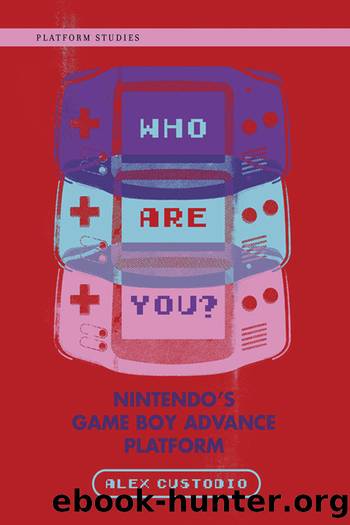Who Are You? by Alex Custodio

Author:Alex Custodio [Custodio, Alex]
Language: eng
Format: epub
Tags: Game Boy; Nintendo; SNES; NES
Publisher: MIT Press
Published: 2020-09-18T00:00:00+00:00
Boktai: The Sun Is in Your Hand
In 2003, Konami launched a peculiar series known as Boktai, from the Japanese ãã¯ãã®å¤ªé½ (Bokura no TaiyÅ). The first installment, Boktai: The Sun Is in Your Hand, follows a vampire hunter named Django the Solar Boy (the name is a nod to spaghetti Westerns) tasked with preserving the world from the undeadening of humanity. Armed with the Gun del Sol, Django must harness the power of the Sun to restore light to a postapocalyptic world. The action-adventure role-playing game (RPG) takes its cues from Hideo Kojimaâs previous idiosyncratic work on the Metal Gear series, in that avoiding enemies is key. But, more important, Boktai challenges the way that we think about the spatial affordances of portable play.
Djangoâs ability to navigate cities ravaged by armies of reanimated corpses and his power to put an end to them are both dependent on the Sun. Like Twisted!, the transparent cartridge accommodates additional hardwareâin this case, a solar sensorâto produce a different sensation of play. Distinct from photometric light sensors that respond to any ambient illumination, the solar sensor reacts specifically to ultraviolet (UV) radiation so that sunshine on the cartridge manifests as sunlight in the game. Beams of light pierce dungeon ceilings to damage undead enemies and allow Solar Boy to recharge his weapon at will. Depending on the strength of the Sun, Djangoâs magic power increases more or less quickly. Without it, he relies on limited banked currency (known as âsollâ) to purchase goods and sustain his offensive prowess.
Although artificial sources of solar power coupled with stealth-focused navigation allow Django to get by during the dead of night, some aspects of the game make sunlight a necessity. Bosses can be purified only with a solar-powered device known as the Pile Driver, but until such time as theyâve been eviscerated, their spirits can exert agency. You can defeat a boss at night and drag its remains to the Pile Driver, but you wonât be able to use the instrument until your cartridge is in the Sun. In the meantime, the battery-backed real-time clock tracks how long it takes you to return with ambient sunlight. Take too long, and the boss will escape, crawling back to its lair by the time you turn the game back on.
As a result of the gameâs unique mechanics, the setting is key to Boktai. Itâs rare to find someone playing the game in most of the spaces we might expect to see the GBA. Itâs ill suited for planes, subway platforms, and waiting rooms, and itâs not something that you can easily pick up at night after work for a couple of hours before bed. While you can orient yourself toward natural light indoors, Boktai is best enjoyed outside, in parks, backyards, or other open-air spaces. And because the GBAâs screen is uniquely suited for direct sunlight (unlike backlit screens, which get washed out), Boktai makes the most of the hardwareâs greatest shortcoming. The hardwareâs deficiencies become advantages through a clever hardware addition.
Download
This site does not store any files on its server. We only index and link to content provided by other sites. Please contact the content providers to delete copyright contents if any and email us, we'll remove relevant links or contents immediately.
| Coloring Books for Grown-Ups | Humor |
| Movies | Performing Arts |
| Pop Culture | Puzzles & Games |
| Radio | Sheet Music & Scores |
| Television | Trivia & Fun Facts |
The Infinite Retina by Robert Scoble Irena Cronin(6231)
Harry Potter and the Cursed Child: The Journey by Harry Potter Theatrical Productions(4484)
The Sports Rules Book by Human Kinetics(4367)
Molly's Game: From Hollywood's Elite to Wall Street's Billionaire Boys Club, My High-Stakes Adventure in the World of Underground Poker by Molly Bloom(3522)
A Knight of the Seven Kingdoms by George R R Martin(3304)
How To by Randall Munroe(3094)
Quidditch Through the Ages by J.K. Rowling(3090)
Flowers For Algernon by Daniel Keyes(3088)
Quidditch Through the Ages by J K Rowling & Kennilworthy Whisp(2959)
Stacked Decks by The Rotenberg Collection(2866)
Quidditch Through the Ages by Kennilworthy Whisp by J.K. Rowling(2842)
Quidditch through the Ages by J. K. Rowling(2785)
776 Stupidest Things Ever Said by Ross Petras(2764)
Quidditch Through The Ages by J. K. Rowling(2753)
Ready Player One: A Novel by Ernest Cline(2700)
What If?: Serious Scientific Answers to Absurd Hypothetical Questions by Randall Munroe(2689)
Beautiful Oblivion by Jamie McGuire(2595)
The Book of Questions: Revised and Updated by Gregory Stock Ph.d(2554)
Champions of Illusion by Susana Martinez-Conde & Stephen Macknik(2439)
